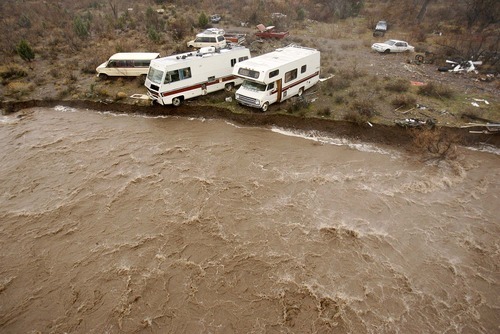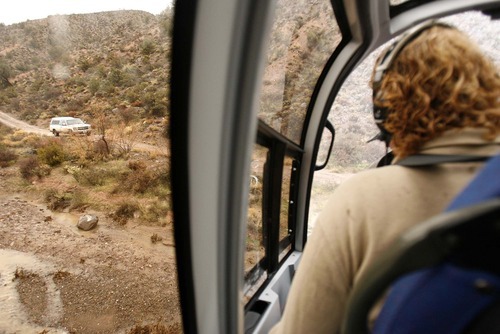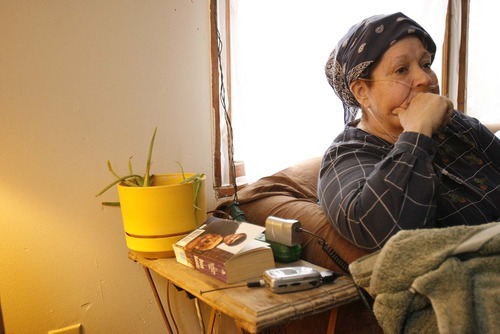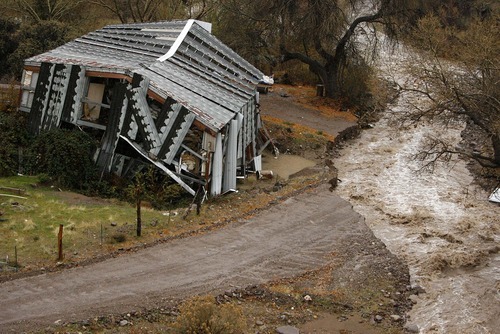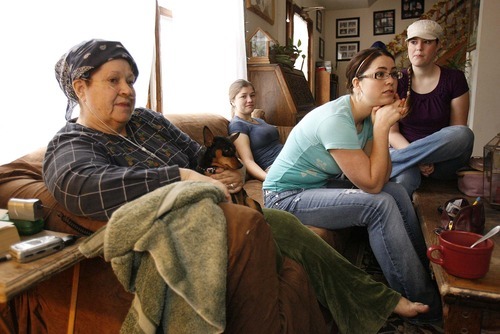This is an archived article that was published on sltrib.com in 2010, and information in the article may be outdated. It is provided only for personal research purposes and may not be reprinted.
Motoqua • Living in this small community offers plenty of isolation, but when floodwaters wash out the only roads that connect it to civilization, its location near the Nevada state line can be a problem — especially if you need medical supplies.
That is the situation Gina Putnam found herself in Wednesday, but her needs were answered by helicopter pilot Jeremy Johnson and her two daughters, who delivered the woman her oxygen and medications.
"There are a couple of places where the road has washed out, and we can't get to her any other way," Elizabeth Putnam said as Johnson lifted his helicopter into the low-hanging rain clouds around the St. George airport.
The clouds that have hunkered down over southern Utah for the past few days continue to feed the swollen streams, isolating communities such as Motoqua and Brookside, farther to the north.
Johnson, at his own time and expense, has flown since Monday to ferry supplies to the stranded and give officials a bird's-eye view of flood-stricken areas.
"I donate everything because I enjoy it," Johnson said. "I love to fly."
"He's fantastic," Elizabeth Putnam said of the pilot.
After flying for about 20 minutes following the muddy dirt road to Motoqua, it became apparent how inaccessible the community has been made by the rampaging Beaver Dam Wash.
The wash was responsible Tuesday for wiping away several homes in Littlefield, Ariz., located downstream just before the confluence with the Virgin River.
The wash that is normally dry this time of year was churning in several different channels that were full of debris and boulders.
Descending on the Putnam residence, Johnson landed on a section of dirt road that was washed out during the flooding of 2005.
A large metal outbuilding toppled by the 2005 flood still lies on its side on the wash's bank.
"He [Johnson] takes good care of the community," said Gina Putnam, who was grateful to receive the medical supplies.
Putnam, who lives alone with her dogs, Minji and Rufus, has spent 30 years in Motoqua. She saw the number her neighbors drop from about 300 before the 2005 floods to about 50 after.
Elizabeth Putnam, 27, said she and her two sisters and four brothers were home-schooled — as were all children in the community.
"We didn't have electricity until I was 12," said Elizabeth Putnam, who went on to earn a biology degree at Dixie State College and now works as a lab technician in Washington, D.C. "Growing up [in Motoqua] was exciting and more an adventure than scary."
Gina Putnam said that as isolated as she is, friends and neighbors are always dropping by to check on her, and Christmas this year will be a potluck with others in the community and will include Elizabeth and sister Susanna Putnam, who was also on Wednesday's flight.
Ben Baker, who was visiting Gina Putnam on Wednesday, said the flood took out land where he cultivates fruits and vegetables, including strawberries, squash, zucchini and melons for farmers markets and spas.
"I just dug [the field] out from the 2005 flood and now have probably lost another 6 acres," Baker said.
His brother Travis' home was flooded, forcing him to move his family into Ben Baker's home until the water subsides.


